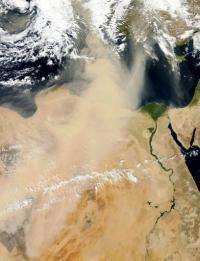Mars radar could help find water in Mideast: NASA

Technology used to discover underground ice on Mars could also be used in the search for water on Earth and help ward off conflict in the arid Middle East, a NASA scientist said Thursday.
A probe launched by the US space agency NASA discovered in 2007 that the desert which covers Mars sat on enough frozen water to submerge the Red Planet.
The same radar technology should be used in the vast deserts of the Middle East and North Africa, scientist Essam Heggy told a UN-sponsored water conference in the Egyptian coastal city of Alexandria.
"We (in the region) are best placed to use this technology," Heggy told participants at the United Nations Development Programme-sponsored conference.
The equipment, dubbed Marsis, consists of a radar sounder with a 40 metre (131 foot) antenna fitted to an orbiter that is able to bounce radio waves 3.7 kilometres (2.3 miles) beneath the surface of Mars.
Heggy said the technology could detect water up to one kilometre (0.6 mile) beneath the dense deserts that cover much of the Middle East and North Africa and which experts say threaten to consume more land in the next century.
Scans taken by NASA showed an especially arid region of Darfur in Sudan sat on top of 6,000-year-old valleys and lakes.
The "water that was at the surface is now on the subsurface level," said Heggy, a planetary scientist with NASA's Jet Propulsion Laboratory.
"If we don't have these images we're shooting in the dark."
Middle East countries, which include the world's largest oil exporters, spend more on oil discovery than any other region in the world but devote the least amount of funds to water exploration, Heggy said.
"Water has no substitute. But still, we're not looking for it," he said, adding that its scarcity could trigger potential water-related conflicts in the region.
"Water is a resource, like any other resource. And we have seen conflicts over resources," he said.
(c) 2010 AFP



















